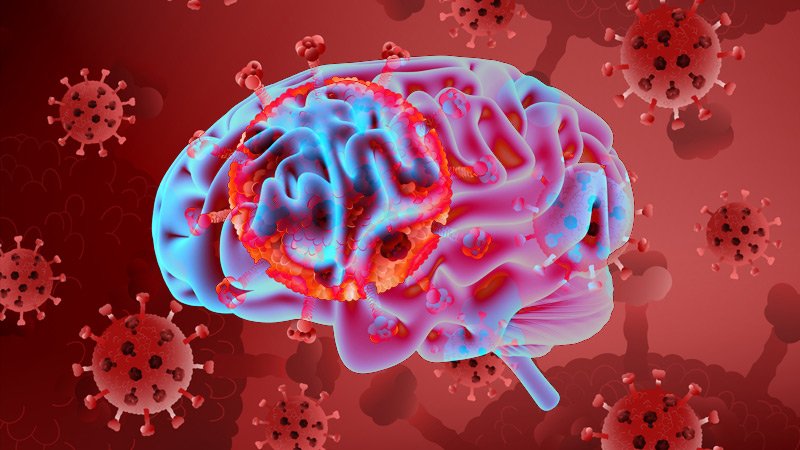“We’re seeing things in the way Covid-19 affects the brain that we haven’t seen before with other viruses,” said Michael Zandi, a senior author on the study.
Scientists warned on Wednesday of a potential wave of coronavirus-related brain damage as new evidence suggested COVID-19 can lead to severe neurological complications, including inflammation, psychosis and delirium. A study by researchers at University College London (UCL) described 43 cases of patients with COVID-19 who suffered either temporary brain dysfunction, strokes, nerve damage or other serious brain effects. The research adds to recent studies which also found the disease can damage the brain. “Whether we will see an epidemic on a large scale of brain damage linked to the pandemic – perhaps similar to the encephalitis lethargica outbreak in the 1920s and 1930s after the 1918 influenza pandemic – remains to be seen,” said Michael Zandi, from UCL’s Institute of Neurology, who co-led the study, Reuters reported.
One 55-year old woman with no known current or historical mental illness was admitted to hospital with recognized Covid-19 symptoms including fever, cough and muscle aches. She was discharged after two weeks, having been treated with oxygen, but four days later her husband reported she was confused and behaving strangely. She then experienced hallucinations, reporting seeing lions and monkeys in her house, and became delusional and aggressive with her family and hospital staff. She was treated with anti-psychotic medication and her symptoms improved over the course of three weeks, although the study does not confirm whether she made a full recovery. Other neurological issues experienced by the Covid-19 patients, who ranged in age from 16-85, included more cases of delirium or psychosis, strokes and problems with peripheral nerves found in extremities like hands and feet, according to Forbes.
Another dozen patients observed in the study had swelling in their central nervous systems; one person within that group died. Nine of those 12 patients were diagnosed with acute disseminated encephalomyelitis (ADEM), a rare kind of inflammation that usually attacks nerves in children’s brains and spinal cords after an infection like mumps or measles. The study authors reported that the number of ADEM cases at the hospital rose from one per month before the coronavirus pandemic to two or three per week in April and May. Seven other patients in the study were diagnosed with Guillain-Barré syndrome; some them developed neurological symptoms up to three weeks after their other COVID-19 symptoms. Overall, the researchers found that life-threatening neurological conditions weren’t necessarily linked to severe respiratory symptoms among patients — that means a patient’s lungs could be fine, but their brain may not be, Business Insider wrote.
“We’re seeing things in the way Covid-19 affects the brain that we haven’t seen before with other viruses,” said Michael Zandi, a senior author on the study and a consultant at the institute and University College London Hospitals NHS foundation trust. “What we’ve seen with some of these Adem patients, and in other patients, is you can have severe neurology, you can be quite sick, but actually have trivial lung disease,” he added. The cases add to concerns over the long-term health effects of Covid-19, which have left some patients breathless and fatigued long after they have cleared the virus, and others with numbness, weakness and memory problems, according to The Guardian.
Another study in the Lancet Psychiatry found brain complications in 125 seriously ill coronavirus patients in UK hospitals. Nearly half had suffered a stroke due to a blood clot while others had brain inflammation, psychosis, or dementia-like symptoms. One of the report authors, Prof Tom Solomon of the University of Liverpool, told medical correspondent of BBC-Fergus Walsh, “It’s clear now that this virus does cause problems in the brain whereas initially we thought it was all about the lungs. Part of it is due to lack of oxygen to the brain. But there appear to be many other factors, such as problems with blood clotting and a hyper-inflammatory response of the immune system. We should also ask whether the virus itself is infecting the brain,” BBC reported.
Coronavirus is continuing its spread across the world, with more than 12 million confirmed cases in 188 countries. At least half a million people have lost their lives. The virus, which causes the respiratory infection Covid-19, was first detected in the city of Wuhan, China, in late 2019. It then spread quickly across the globe in the first months of 2020, reaching 12 million confirmed cases in early July. Europe and North America saw the first major outbreaks in April but as they began to ease, Latin America and Asia started seeing an increase in cases. North America has seen a resurgence of infections in recent weeks, mostly driven by new outbreaks in the US, but Mexico has also seen an increasing numbers of cases, according to BBC.






